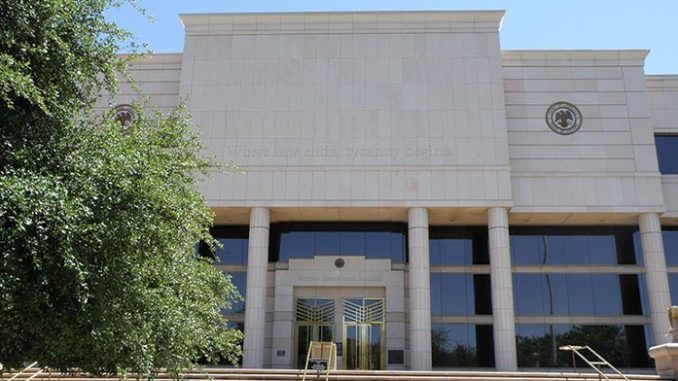
The Arizona Supreme Court should disregard a legal challenge filed by the Arizona Republican Party about whether the method the vast majority of the state’s voters use is constitutional, at least until there is a valid Election Procedures Manual in place.
That is the opinion of Arizona Attorney General Mark Brnovich as expressed in a brief filed Friday with the court.
According to Brnovich, the justices does not have jurisdiction over the State to provide the relief sought by the AZGOP. But for now the court should accept jurisdiction to decide an issue of pure law relating to the Election Procedures Manual (EPM) which governs the operation of nearly every election in the state, he argues.
The purpose of the EPM is to “achieve and maintain the maximum degree of correctness, impartiality, uniformity and efficiency on the procedures for early voting and voting, and of producing, distributing, collecting, counting, tabulating and storing ballots.”
In 2019, the Arizona Legislature amended the EPM law to require the Secretary of State provide a draft EPM to the Governor and the Attorney General no later than Oct. 1 of odd-numbered years. However, the draft EPM provided by Hobbs last October was “chock full of provisions beyond the scope” of her authority, Brnovich noted in his brief.
When Hobbs’ could not get her draft EPM approved, she informed Arizona’s county election officials they will have to rely on the outdated 2019 EPM for the 2022 election cycle.
“It is the State and the AG’s position that the 2019 EPM is no longer valid,” Brnovich argues, adding that the lack of a legally-binding, valid EPM “could have a significantly deleterious impact on the 2022 elections.”
The Supreme Court should require Hobbs to submit a valid draft EPM with provisions within her authority as Secretary of State by a date certain in the near future, Brnovich argues.
“The Court should accept jurisdiction to decide that pure legal issue, which is a matter of statewide importance,” Brnovich argues. “The parties to this action, and scores of election officials throughout the State, require clarity on whether the 2019 EPM remains valid for purposes of the 2022 election cycle, which will begin in earnest in a matter of months.”
But one thing the Justices cannot do at this time, the attorney general believes, is consider the AZGOP’s challenge to the state’s vote-by-mail or absentee voting laws.
No-excuse early voting (or absentee voting) was first allowed in Arizona in the early 1990s. In the 2020 General Election, nearly 90 percent of all voters relied on mail-in ballots.
Vote-by-mail is only available to registered voters who specifically request a ballot be mailed to the address on their voter registration file. A voter can then use the U.S. Postal Service to return the ballot to their county recorder in a provided envelope or drop off the enveloped ballot at official polling places or county provided drop boxes.
The AZGOP contends the Arizona Constitution does not allow for voting by mail or absentee voting, based on a provision which reads that voter initiatives be decided in “such manner that the electors may express at the polls their approval or disapproval of (a) measure.”
“In-person voting at the polls on a fixed date (election day) is the only constitutional manner of voting in Arizona,” the petition argues. The only allowable exception, the AZGOP argues, would be for military members and their families who are covered by federal election law.
As an alternative to a complete end to early voting, the AZGOP suggests the Arizona Supreme Court reinstate excuse-only early voting. The petition also demands several other restrictions be implemented related to vote-by-mail.
But Brnovich contends the Justices need to stay out of that issue at this time, particularly because the AZGOP did not name the state’s 15 elected county recorders as respondents.
“Finally, while Petitioners raise important issues about the constitutionality of the early-voting system in Arizona, the Court does not have original jurisdiction over the State,” the attorney general’s response states. “Thus, the Court should deny jurisdiction over that issue without addressing the merits of the claim.”
The only AZGOP officer named as a petitioner is Yvonne Cahill, the organization’s secretary. Cahill is also named in her capacity as an Arizona taxpayer and voter.
The petitioners have until March 17 to file a reply to Brnovich’s response and one filed by Hobbs. All parties then have until March 18 to file response to any amicus curiae (friend of the court) briefs.
Also on Friday, the Arizona Democratic Party filed papers to be designated an official intervenor in the case. As of press time no decision has been recorded by the court on that request.
Brnovich is representing the interests of the State of Arizona and his office, while Hobbs is represented by a privately retained law firm. The Justices have announced they will consider the AZGOP petition without oral arguments.
READ MORE ABOUT THE LAWSUIT HERE
